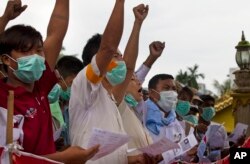One of the Buddhist nationalists in Myanmar who joined an anti-government protest encampment outside Yangon’s famed Shwedagon Pagoda late last week has vowed that he and other demonstrators were in it for the long haul.
“If we get three demands, we will stop our boycott,” the monk, Pyinyar Wuntha, told journalists on Friday, two days into the sit-in. “Otherwise we will keep fighting until the government steps down."
By Sunday evening, however, they had abandoned their position, and local residents were using a traditional disinfectant to clean up the area. Hours earlier, police broke up an affiliated protest camp in Mandalay, arresting at least half-a-dozen monks and charged them with a form of incitement. A third location in the Shan State capital of Taunggyi also emptied out.
The office of State Counselor Aung San Suu Kyi expressed "heartfelt thanks" to members of the public for not joining the action, and the appreciation was later published on the front page of the state-backed Global New Light of Myanmar.
NLD hard line against nationalists
Aung San Suu Kyi’s National League for Democracy (NLD), which came to power more than a year ago as part of a transition away from decades of junta rule, has taken a decidedly harder line against Buddhist nationalists than the previous military-backed administration, earning cautious praise at a time when it is in desperate need of success stories.
“You could say that governments being the way they are, you need some pluses. Because things haven’t been going well for the present NLD government generally," said Khin Zaw Win, director of the Yangon-based think tank the Tampadipa Institute. “So I think moving against the extremist monks is popular.”
He added that the crackdown was only the latest move in an ongoing contest between the two forces.
“You still have to finish this game, it’s not finished yet. And they’ve got to play their cards carefully,” he said.
Buddhist nationalists on the defensive
The former pro-democracy activists have faced withering criticism in their new roles as politicians. The economy is not exactly booming. There's a sputtering peace process, and Myanmar's military still has an uncomfortable amount of control in national affairs.
But the NLD has also stepped up efforts, in concert with the state Buddhist leadership, to isolate Buddhist nationalist movements, which proliferated amid religious violence that has plagued Myanmar’s transition to democracy since 2011.
The political winds have helped them. Support for the groups waned after historic elections in 2015, when the NLD won a resounding victory against the Union Solidarity and Development Party, which had been touted as the right pick by some of the more vocal nationalist figures such as Ashin Wirathu.
The declining influence was on full display during the protest encampments, which produced a small turnout. A group calling itself the Myanmar Boycott Organizing Committee circulated a call to action on Facebook that, even though it could not be independently verified, highlighted the embarrassingly poor attendance.
“We would like to remind nationalists across Myanmar who are protecting race and religion. Our committee is now contacting you by phone as we need more people,” the statement said. “We would like to remind you to confirm whether you can come and support or not when we call. We would like to remind nationalists who said that they would sacrifice their lives for race and religion that you should pick up phone calls after taking expenses.”
The protesters had three demands: to release other nationalists held by authorities; to remove the NLD's religious affairs minister Aung Ko; and to formally announce that the Rohingya, a Muslim minority group in Rakhine State, do not exist and are illegal migrants from Bangladesh.
Concerns remain about NLD government
More than 120,000 Rohingya live in internal displacement camps since anti-Muslim clashes with Buddhists in 2012. The military stands accused of widespread rights abuses that allegedly occurred in the northern part of Rakhine during a hunt for Rohingya militants who attacked police border guard posts in October. The government denies the allegations.
At a press conference over the weekend the religious affairs minister dismissed the suggestion that the government step down as unreasonable.
But while many welcome a tougher position in general, concerns remain over the way the government handled the incident and whether the sit-in actually amounted to hate speech, which authorities have struggled to control with the explosion of internet access in the country over the past few years.
“There's a fine line here between combating extremists and violating freedoms of expression and assembly. The mark of a liberal democracy is its ability to tolerate and even protect illiberal voices,” Matthew Smith, a co-founder of the NGO Fortify Rights, said in an email. “We don't agree with what they stand for but we'll protect their right to stand for it, so long as they don't incite violence or use hate speech. Those who incite violence should be prosecuted and held accountable and the authorities really need to do more to combat hate speech. It's a deadly serious national problem.”






